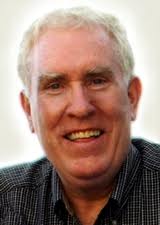President David O. McKay liked to recite this version of a famous poem:
Boys flying kites haul in their white winged birds,
But you can’t do that when you’re flying words.
Thoughts unexpressed, often fall back dead,
But God himself can’t kill them once they’re said.
It is obvious that words have meaning, but often we ignore the consequences.
BYU recently played a football game at the University of Colorado. Many BYU fans attended, and the football team did well, which sent many of the Colorado fans into a frenzy where they began shouting the worst obscenities to the BYU team and crowd. “***** BYU” and later accelerated the chants with “***** the Mormons.”
This is nothing new. Semantic expert S.I. Hayakawa often referred to language around the edges of our “normal” speech as either “snarl words” or “purr words.”
Today we see the same old worn-out “snarl words” that have one thing in common: they are expressions of hate. Hateful words to athletic opponents are nothing new – it is often the last resort of losers. Can’t beat them on the field, call them names.
But… if BYU fans were to chant “***** the Catholics” or Baptists or Jews or Muslims, imagine the verbal carnage in the media that would follow. And, yes, such language and verbal violence should be castigated.
BYU teams and fans have heard the same things at the University of Arizona, Arizona State University, University of Southern California, and University of Oregon. Don’t forget San Diego State and many others.
In most cases, the administrations of these universities issued an apology, saying such speech has no place. Hollow word apologies one and all. The Big 12 Conference, to which BYU and Colorado belong, took the consequences of foolish words to the next level and fined the University of Colorado $50,000. Considering most of these universities generate more than $50 million in revenue per year, a $50,000 fine amounts to a few Buffalo chips. Still, it’s a good start.
So what? Did the words have consequences? Hardly. So, it is time to have some clarity on such verbal palaver. Cutting to the chase of “words have consequences,” we must acknowledge that some free speech has boundaries.
Proverbially, we protect free speech by pointing out that you can speak your mind, but there are severe consequences for yelling Fire!… in a crowded theater when there is no fire. We don’t stand for semantics or symbolism, or allegory, when the verbal actions may produce the destruction of someone else.
We do need to be peacemakers, and part of that may be dealing with outright hatred pointed toward us.
To the point – and let’s make it a sharp point – the hatred toward Jews began as verbal assaults through the ages, justifying the slanders against Jews as just pointing out they “killed Christ.” Religious virtue to desecrate someone else.
Closer to home, it seems that some evangelical pastors love to shout, with righteous indignation, “Mormons Aren’t Christians.” Was his indignation filled with the love of Christ? Not hardly. And for some mentally ill parishioners, they glom onto the hateful rhetoric and shout at people attending the LDS General Conference.
But it has gotten worse.
Tolerance of hateful verbal bigotry flamed the hatred of “Mormonism” in an unstable former Marine; to gather all the hateful “Mormon” rhetoric and let it culminate in action against a congregation of the Church of Jesus Christ of Latter-day Saints in Grand Blanc, Michigan. With his hate, he stockpiled incendiary devices in his truck, being careful not to let them go off while he drove to the church. To load up his rifle and put on his gear, and delude himself into thinking his truck could penetrate the front brick wall. It takes a lot of hate to prepare all of this.
The same hatred is fueled by students at universities who attempt to belittle BYU fans by using the “***** the Mormons” chant.
It isn’t innocent. It isn’t without consequences. That same evil spirit possesses others who possessed the killer in Michigan.
It is time for the hatred to end.
Curse words, swear words, profanity, whatever, are mindless expressions that seek for instant gratification. They’ve been around for some time. Maybe Cain said something to disable someone. No doubt.
While teaching college students at a secular university, the principles of business and communication, I pointed out that their favorite expletive used– the “f-bomb,” was a sign of an uncreative mind. They disagreed and thought “it is real.” Yawn. So, I suggested that if they thought it very clever, the next time they heard a speaker unloading with that one word, substitute the word “duh.” I had someone give a potentially vulgar series of sentences filled with great emotion, but whenever they were going to say the bomb, they said, “duh.” The fun and explosions soon ceased. Because the word was not taboo, it wasn’t fun and showed that the speaker lacked imagination and mental acuity.
Is there a replacement word for the 4-letter word currently in vogue? Sure. It will come up. In any society, in an attempt to explode mentally, we select a word or words that our society has conjured up and labeled a “bad word.” We all agree that that word should give us emotional release because it is naughty, and we thus push off to someone or something else our frustrations. In England, the agreed-upon naughty word is “bloody.” Sorry, sort of, if I just offended someone again, like I did my first Sunday in an LDS church service when a fellow quickly exited the Sunday School class with blood on his handkerchief. I said, reactively, “Oh, let me help. You’ve got a bloody nose.” He looked startled and growled back, “And you’ve got a bloody nose on your bloody face.” I didn’t get it. My father explained it to me.
But why “bloody?” It is a smashing of words together over time from the sacrilegious oath, “By the blood of our Lady.” In the end, what it meant “really” didn’t matter. It mattered that society agreed it was bad.
But words are not bad. They’re inanimate. We are the ones who give words meaning.
And so it is with, “**** the Mormons.” It’s foul and meant to be foul, and until universities and political parties that like to banter around words like fascists or commies, or Hitlerian, Mormons aren’t Christians but a cult or whatever, become civilized, they will become, unwittingly, co-conspirators to the mentally ill who use that verbal platform as a justification to kill other people. At that point, our language becomes a co-conspirator with the criminal.
Now, a question for practicing Latter-day Saints. Ever called a politician “Hitler,” or apostate, or fascist, or “ex-Mo’s,” or “libs,” or whatever mental shorthand we used to disparage others without intelligently and rationally having a true dialogue without vitriol? I once urged a political gathering where I was the precinct leader, “let us disagree without being disagreeable and discuss without being disgusting.”
How do we handle profane crowd chants? We have no choice but to leave it up to the authorities AND to petition those authorities to do their jobs and control the hate. AND, speak out with propriety against injustice, speech and actions that are filled with hate.
How do we handle hateful preachers? Just as Christ said. Christ said, …whosoever shall say, Thou fool, shall be in danger of hell fire… first be reconciled to thy brother, and then come and offer thy gift. Agree with thine adversary quickly… (Agree means common ground – find something to agree with.)
It isn’t easy, and I’m NOT the fine example. I’m a practicing Latter-day Saint and intend to keep practicing until I get it right.
Let’s stop flying words because once expressed, even God can’t kill them once they’re said.




















